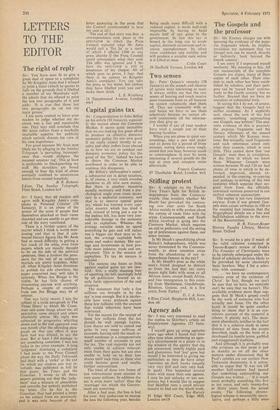Capital gains tax
Sir: Congratulations to John Biffen on his article (30 January), especial- ly the section about the Common Market. It seems quite incredible that we are making this great effort to produce an effective domestic economic policy for our own good if we really expect shortly to re- ceive and obey orders from abroad as to how we are to conduct our domestic economic policy for the good of the 'Six'. Indeed we have to throw the Common Market overboard in order to be able to continue this discussion.
Mr Biffen's 'philosopher's stone', a substantial cut in direct taxation, is, of course, a very much overdue incentive to all who earn money. But there is another incentive equally necessary and from a psy- chological angle even more neces- sary in a capitalist economy, and that is to remove capital gains tax; which has harmed every capi- talist country which has tried it and, instead of being just a sop to the jealous left, has done very con- siderable damage to the economy and to capitalism. Whereas the average socialist tends to spend everything he gets and will rather run a bigger car than save or in- vest, the average capitalist both earns and makes money. His sav- ings and investments in turn pro- vide more industry, trade and em- ployment. This is the essence of capitalism. To tax its success is suicidal.
The reasons one hears so little against capital gains tax are two- fold: first, a really shaming fear of upsetting the left, seemingly held by all politicians. Second an ut- terly futile appreciation of the real situation.
The statement that 'only a few millions are brought in by the tax' is true enough. But it is intoler- able how many pinheads equate these few millions with the amount that would otherwise have been reinvested.
Yet the reason for the receipt of these few millions &Om the tax should be well enough known. Loss shares are sold to cancel out gains in very many millions of accounts, leaving only the much re- duced surpluses in a comparatively small number of accounts to pay the tax. The vast majority are not only unable to achieve reinvest- ment from their gains but are also unable to hold on to their loss shares until such time as these also could become gains and enable further reinvestment.
The total of these two forms of lost reinvestment must amount to very many millions. In addition the tax is even more 'unfair' than the 'marriage' tax which the Govern- ment are removing.
After a bad year, the loss is lost for ever. Any endeavour to recoup the loss the following year, besides being made more difficult with a reduced capital, is made well-nigh impossible by having to hand nearly half of any gains to the government. In fact this tax is bound in the long run to erode capital, diminish investment and in- crease unemployment. Its effect ruins confidence and stability and will produce a socialist state unless it is killed at once.


































 Previous page
Previous page